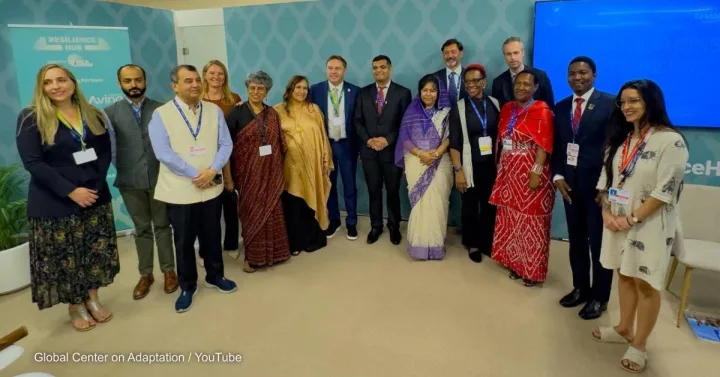
While much of the focus of the recent 28th United Nations Climate Change Conference, or COP 28, was on the tense and high-stakes negotiations, climate solutions were also given a moment in the spotlight. Four innovative projects from Bangladesh, India, Mexico, and Tanzania were recognized in Dubai at the Local Adaptation Champions Awards ceremony for their role in helping local communities adapt to rising climate extremes.
The solutions: Bangladesh’s Local Government Initiative on Climate Change, or LoGIC, won for its work with local communities to help get finance for local adaptation actions. “By facilitating access to markets and financing, the project enables climate-vulnerable communities to upscale adaptive practices, diversify income sources, and invest in climate-resilient livelihoods based on traditional knowledge at both national and local levels,” said Mohammed Fazla Azim, Bangladesh local government’s joint secretary and national project director.
Another winning initiative came from Aumsat Technologies from India, which made a device that uses satellite-based radar analytics to pinpoint underground water sources and optimal locations for groundwater recharge sites — thus saving time for farmers who might otherwise have to dig wells without knowing if they would find water.
Espacio de Encuentro de las Culturas Originarias A.C., or EECO, won for engaging communities in the development and implementation of ecotechnologies such as dry toilets, energy-saving stoves, fog catchers, and vegetable patch irrigation systems in Oaxaca, Mexico. And the Pastoral Women’s Council won for its work in northern Tanzania to enhance Indigenous women’s leadership capabilities in rural societies.
“Although pastoralist men and women are equally exposed to climate shocks and stress, … [women’s] knowledge of the environment is crucial but often goes ignored in drought-mitigation and adaptation strategies,” said Maanda Ngoitiko, co-founder and executive director of the council.
Why it matters: Global carbon emissions have continued to rise in 2022, and the window to limit average global temperature rise to 1.5 degrees Celsius is narrowing. “As the climate crisis continues to escalate, these awards shine a light on community-led local adaptation measures that can effectively build resilience at the grassroots,” said professor Patrick Verkooijen, chief executive officer of the Global Center on Adaptation, or GCA.
The details: The Local Adaptation Champions Awards were given on Dec. 5 by the Global Center on Adaptation — a Netherlands-based organization that aims to broker solutions to adapt to the changing climate. Former U.N. Secretary-General Ban Ki-moon is a part of GCA’s leadership team and was also a part of the jury that selected the winners, who were chosen from a pool of 500 applicants from around the world.
What’s next: The winners each received €15,000 ($16,270) to invest in their future activities. They will also receive continued support from the Adaptation Fund, including access to networking events. “We are excited to follow the winners’ journeys over the next year and beyond as they utilize the award prize money and Adaptation Fund sponsorship opportunities to develop and scale up their work,” Verkooijen said.